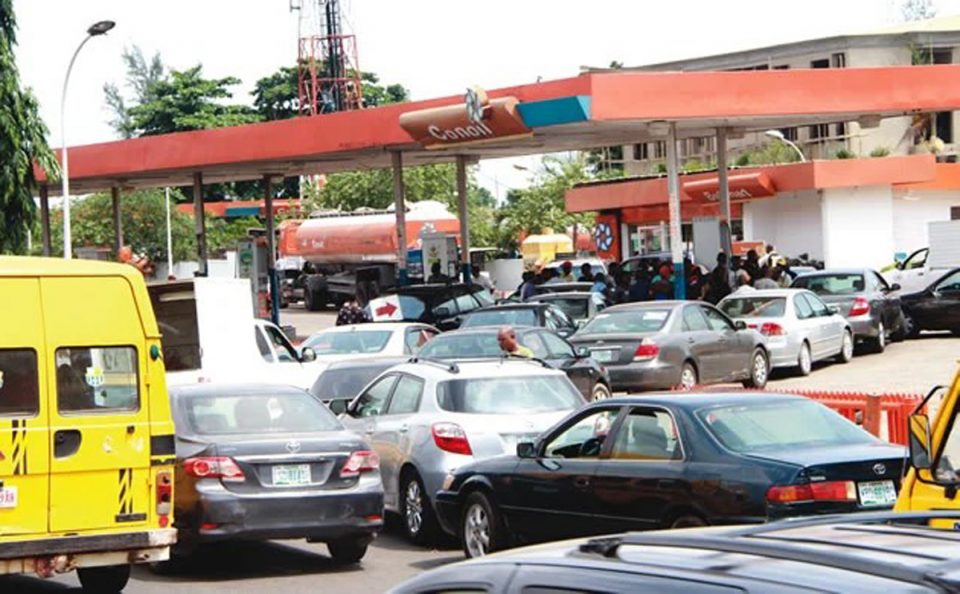Fuel scarcity resurfaced at the weekend and worsened yesterday in many parts of the country.
In most parts, where petroleum products, especially the premium motor spirit (PMS, or petrol), were available, the price had been increased by the marketers. This resulted in fare increase in some states.
Lagos, Kaduna, Jos were the worst hit by the fuel scarcity.
The Nation reports that across the streets of Lagos and environs, long queues, sometimes stretching to about one kilometre in some areas, were prevalent.
The scarcity was mainly about supply, rising ex depot price and the problem of payment of bridging gap to marketers by the Nigerian Midstream Downstream Petroleum Regulatory Agency (NMDPRA).
As at yesterday, some retail outlets sold petrol for N200 per litre, thereby making way for black market to thrive.
In the black market, the commodity sold for between N300 and N500 a litre.
A source told our correspondent that as at Friday, his filling station loaded fuel at an ex depot price of N175 per litre.
The Independent Petroleum Marketers Association of Nigeria (IPMAN) has been at loggerheads with NMDPRA, calling for the payment of outstanding bridging gap claims, which it estimates at over N50 billion, to its members.
The Abuja-Suleja branch of IPMAN, through its Secretary, Mohammed Shuaibu, hinted at the weekend of a possible strike to drive home the union’s demand.
He said majority of the branches were ready to join the strike in solidarity.
But the extent of the solidarity strike is suspect because last week, the Southwest Zone of IPMAN agreed to ensure the availability of petrol to consumers.
The agreement was reached following a meeting between top executives of the marketing group and NMDPRA Chief Executive Farouk Ahmed in Abuja.
After the meeting, the General Manager of the Corporate Communications Department of NMDPRA, Kimchi Apollo, announced in a statement that the marketers pledged their continuous support to the Federal Government by ensuring that petrol was available at the regulated price of N165 per litre at retail stations.
IPMAN Southwest Zonal Chairman Dele Tajudeen Lamidi highlighted some of the problems faced by the marketers at the meeting.
These include product sharing, rise in penalties, difficulty in getting tax clearance and high cost of doing business in the country.
The union leader assured the nation that despite the challenges the association was facing, it had resolved to avoid any industrial action.
“As far as we are concerned in the Southwest, we have gone beyond strike. Strike is not the solution to any problem. This is because if there is a strike, it affects the masses and our businesses.
“We will work together to ensure free flow of petroleum products and make sure that products are sold at the government-regulated price, if we get them at the normal price,” he said.
In Kaduna State, the scarcity has been persistent in the last five months.
Many major filling stations within the Kaduna township no longer have the products regularly.
Fuel queues have become the new normal in the state capital.
In the outskirts of the town, where the product is available, it is sold for between N210 and N230 per litre.
Those who sell in Jerry cans take between N300 to N380 per litre.
In Jos, the Plateau State capital, long queues of motorists struggle to buy fuel at filling stations.
The fuel scarcity started resurfacing when many filling stations began barricading their entrance and exit points.
The Eid-el-Kabir holidays did not affect transport fares negatively as the fares remained between N70 and N150, depending on the distance.
Our correspondent who went round the Tin City said fuel scarcity has been a common sight at many filling stations.
The Nation reports that the only filling stations that sold the product yesterday was AYM Shafa and A.A Rano on Bauchi Road.
Most of the filling stations in Bukuru, the headquarters of Jos South Local Government Area, were empty.
Some motorists at AYM Shafa and A. A. Rano filling stations told our correspondent that though it was hard to get the product, the pump price had not been increased as at yesterday.
But our correspondent said the situation was different at many other filling stations where independent marketers sold the product at between N100 and N200 per litre.
Black marketers sold the product for between N900 to N1,200 on the streets.
Residents of Jos North and Jos South decried the queues they faced at most filling stations.
In Katsina, Abia and Ebonyi states, the scarcity led to increase in the pump price – between N185 to N195 per litre – at most filling stations.
This also forced motorists to increase transport fares in these states as well as in Enugu and Rivers states.
But there was scarcity in Benue, Edo, Delta and Anambra states where the product sold for the normal N165 per litre, in most cases, though some independent marketers have increased the price.




